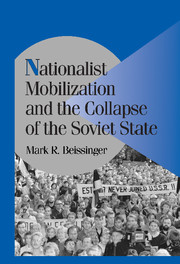Book contents
- Frontmatter
- Contents
- Illustrations
- Tables
- Acknowledgments
- 1 FROM THE IMPOSSIBLE TO THE INEVITABLE
- 2 THE TIDE OF NATIONALISM AND THE MOBILIZATIONAL CYCLE
- 3 STRUCTURING NATIONALISM
- 4 “THICKENED” HISTORY AND THE MOBILIZATION OF IDENTITY
- 5 TIDES AND THE FAILURE OF NATIONALIST MOBILIZATION
- 6 VIOLENCE AND TIDES OF NATIONALISM
- 7 THE TRANSCENDENCE OF REGIMES OF REPRESSION
- 8 RUSSIAN MOBILIZATION AND THE ACCUMULATING “INEVITABILITY” OF SOVIET COLLAPSE
- 9 CONCLUSION: NATIONHOOD AND EVENT
- Appendix I PROCEDURES FOR APPLYING EVENT ANALYSIS TO THE STUDY OF SOVIET PROTEST IN THE GLASNOST' ERA
- Appendix II SOURCES FOR THE COMPILATION OF EVENT DATA IN A REVOLUTIONARY CONTEXT
- Index
- Titles in the series
3 - STRUCTURING NATIONALISM
Published online by Cambridge University Press: 18 November 2009
- Frontmatter
- Contents
- Illustrations
- Tables
- Acknowledgments
- 1 FROM THE IMPOSSIBLE TO THE INEVITABLE
- 2 THE TIDE OF NATIONALISM AND THE MOBILIZATIONAL CYCLE
- 3 STRUCTURING NATIONALISM
- 4 “THICKENED” HISTORY AND THE MOBILIZATION OF IDENTITY
- 5 TIDES AND THE FAILURE OF NATIONALIST MOBILIZATION
- 6 VIOLENCE AND TIDES OF NATIONALISM
- 7 THE TRANSCENDENCE OF REGIMES OF REPRESSION
- 8 RUSSIAN MOBILIZATION AND THE ACCUMULATING “INEVITABILITY” OF SOVIET COLLAPSE
- 9 CONCLUSION: NATIONHOOD AND EVENT
- Appendix I PROCEDURES FOR APPLYING EVENT ANALYSIS TO THE STUDY OF SOVIET PROTEST IN THE GLASNOST' ERA
- Appendix II SOURCES FOR THE COMPILATION OF EVENT DATA IN A REVOLUTIONARY CONTEXT
- Index
- Titles in the series
Summary
Human development is a form of chronological unfairness, since latecomers are able to profit by the labors of their predecessors without paying the same price.
Alexander HerzenCausation necessarily is a complex subject. Any attempt to reduce it either to structural determinism or the complete autonomy of action fails to address seriously the fundamental paradox long ago identified by Marx: that human beings are interactive, communicative animals and therefore conscious creators of their destinies, but that the circumstances in which this occurs are given in part by the past and shape the ways in which we go about doing so.
In the previous chapter we saw initial evidence that three levels of causation operated within nationalism during the glasnost' period: pre-existing structural conditions, institutional constraints, and events. The first was most visible in the ways in which nationalism dominated the mobilizational cycle and was structured spatially, as nationalist mobilization encompassed some groups and segments of populations more than others. The second was apparent in the temporal structuring of nationalism, as the opening and closing of institutions altered the politics by which nationalism played itself out and led to a clustering of challenging actions at particular moments in time. The third functioned as both dependent and independent variable, as events became a greater element of their own causal structure within a context of “thickened” history.
In this chapter, I explore these three levels of causation and their interaction more systematically, providing further evidence of their presence, strength, and interrelationship through the ways in which they left their traces on the patterning of nationalist action.
- Type
- Chapter
- Information
- Nationalist Mobilization and the Collapse of the Soviet State , pp. 103 - 146Publisher: Cambridge University PressPrint publication year: 2002



